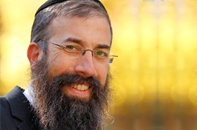 A Word From The Rabbi
A Word From The Rabbi
Dear Friend,
The name of this week's Torah reading is Chayei Sara, literally the "life of Sara." As explained by Rabbi Shneur Zalman, founder of Chabad Chasidism, the Hebrew name of a particular object or creation is what gives it its vitality and sustains it. Thus we must conclude that the entire Torah portion is somehow connected with the "life of Sara."
This, however, appears difficult to understand at first glance. Only the first verse of the Torah portion relates to Sara's life, whereas the rest of it speaks of seemingly unrelated matters: the marriage of Isaac and Rebecca, and the passing of Abraham. Why then is the entire portion known as Chayei Sara?
The answer is that in truth, all of the events related in Chayei Sara - the marriage of Isaac and Rebecca, as well as the passing of Abraham - express the sum and substance of our Matriarch Sara's life.
Concerning the marriage of Isaac and Rebecca, the Torah tells us, "And Isaac brought her into the tent of Sara his mother, and took Rebecca, and she became his wife." When did Isaac agree to marry Rebecca? Only after he brought her into his mother's tent, and the miracles that used to occur during Sara's lifetime resumed.
Rashi, the foremost Torah commentator, explains that there were three specific miracles: 1) the Shabbat candles Sara kindled burned from one Friday afternoon till the next; 2) the dough she kneaded was specially blessed, and; 3) a cloud of holiness hovered over her tent. After Sara's death these miracles ceased; in the merit of Rebecca, they returned.
This occurred three years after Sara passed away, yet we see in these miracles a continuation of her life.
A similar connection exists to the passing of our forefather Abraham. The Torah states, "His sons Isaac and Ishmael buried him." Isaac is mentioned before Ishmael, for by the time Abraham died, Ishmael had already repented. By giving his younger brother precedence, Ishmael demonstrated that the birthright rightly belonged to him.
This development was in the sole merit of Sara, who when she saw that Ishmael was "mocking," i.e., not behaving properly, demanded that Abraham "cast him out...for he will not be heir." Sara's intent was for Ishmael to return to G‑d in repentance, which indeed subsequently occurred. Many years later, after Sara was no longer alive, Ishmael allowed his younger brother to lead the way, again an expression of the continuation of Sara's life.
The entire Torah portion is therefore known as Chayei Sara, as all of the events it relates are connected to Sara's life.
Wishing you a successful and productive week,

Rabbi Yudy Shemtov
Senior Rabbi/Executive Director

